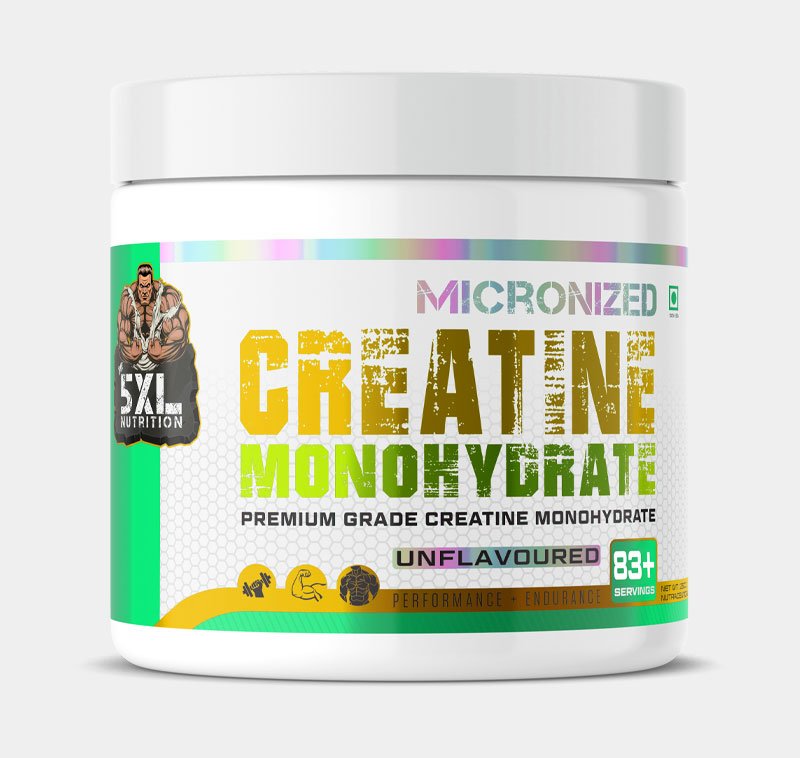How Much Creatine Is Safe for Kidneys? Complete Guide
Creatine has become one of the most researched and widely used sports supplements in the world. From gym beginners to advanced athletes, almost everyone uses it to improve strength, muscle growth, and workout performance. But one question that constantly comes up is: How much creatine is safe for kidneys?
Because kidney health matters, and misinformation around creatine often scares people away from using a supplement that is actually very safe when taken correctly.
In this guide, we’ll break down scientifically how creatine works, its effects on kidneys, recommended dosage, signs of excess use, safe usage tips, real user reviews, and why The 5XL Nutrition provides one of the best supplement brand in India standards with high-purity creatine monohydrate.
Does Creatine Harm Kidneys? What Science Says

Multiple studies have clearly shown that creatine does not damage healthy kidneys when consumed in recommended doses.
The confusion happens because creatine increases creatinine levels in the body. Creatinine is a waste product measured in blood tests to check kidney function. A slight increase in creatinine after taking creatine is normal and does not mean kidney damage.
In healthy individuals:
Creatine is filtered by the kidneys safely
No long-term negative impact has been recorded
Even athletes taking creatine for 5–10 years show normal kidney function
However, individuals who already have chronic kidney disease or reduced kidney function must avoid creatine unless suggested by a doctor.
So, How Much Creatine Is Safe for Kidneys?
Here is the dosage considered 100% safe for healthy adults:
Loading Phase (Optional)
20 grams daily
Divided into 4 servings of 5 grams
Only for 5–7 days
Studies show this phase is safe but not necessary. It simply saturates the muscles faster.
Maintenance Phase
3–5 grams per day
This is the most recommended dosage
Safe for long-term use (months/years)
Kidney-Safe Verdict
Most research concludes that 3–5 grams per day is completely safe for kidneys for adults with normal renal function.
Common Questions Related to Creatine and Kidney Safety
Can creatine increase creatinine levels?
Yes, but that doesn’t indicate kidney damage. It only shows creatine breakdown, not kidney stress.
Should you drink more water when taking creatine?
Yes. Creatine pulls water into muscles, so 3–4 liters water daily supports hydration and kidney filtration.
Can teenagers take creatine?
Yes, from age 16+, if dose is 3–5 grams and workouts are consistent. But proper guidance is important.
Is micronized creatine better for kidneys?
Micronized creatine dissolves better and is easier to absorb, but kidney safety mainly depends on dosage, not type.
Can creatine be taken on non-workout days?
Yes, because creatine works through muscle saturation, not immediate action.
How to Use Creatine Safely for Kidney Health
Never exceed the recommended daily dose
5 grams per day is ideal. More than 10 grams regularly adds no extra benefit.
Stay hydrated
Proper hydration supports faster creatine metabolism and kidney filtration.
Only use high-quality creatine monohydrate
Low-quality creatine often contains impurities that can burden the kidneys.
Get a basic kidney test every 6–12 months
Helpful for people who take supplements regularly.
Avoid creatine during an active kidney infection
Short-term conditions require doctor consultation.
Reviews: What Users Say After Safe Creatine Use
- Aman (Delhi):
“I was scared about kidney issues but 5 grams per day has given me great strength. Blood tests after 3 months showed everything normal.” - Karan (Gurgaon):
“No bloating, no kidney discomfort, and the purity of The 5XL Nutrition creatine is clearly high. My lifts have improved a lot.” - Rohit (Mumbai):
“I drink 3 liters of water daily and the supplement works perfectly. Muscle recovery has improved within 2 weeks.” - Fitness Coach Review:
“As long as dosage is controlled and product purity is good, creatine is one of the safest supplements known today.”
Related products
Read our guide: Best whey protein isolate in India
Compare: Creatine Monohydrate vs Pre-Workout
Know more: How to use whey protein for beginners
Why The 5XL Nutrition Offers Kidney-Safe, High-Purity Creatine
There are hundreds of supplement brands in India today, but purity, lab testing, and ingredient transparency make a huge difference in kidney-safe supplementation.
The 5XL Nutrition stands apart because:
We use 100% pure, lab-tested creatine monohydrate
Zero fillers, zero harmful additives
Each batch goes through third-party testing
High micronization for better absorption
No artificial colors or unnecessary chemicals
You can request a sample, compare it with any top brand, and experience the difference yourself
This is why users and athletes consider The 5XL Nutrition the best supplement brand in India.
If you want safe and effective creatine, purity matters more than anything else, and we never compromise on it.
Final Conclusion: Creatine Is Safe for Kidneys When Taken Properly
So, how much creatine is safe for kidneys?
3–5 grams per day for long-term use
20 grams/day loading for a short period if needed
Safe for healthy individuals
No proven kidney damage in long-term studies
Hydration and purity ensure maximum safety
Creatine is one of the safest and most effective supplements ever researched, and choosing a trusted, high-purity brand like The 5XL Nutrition ensures you get clean, kidney-safe creatine every time.
If you want to build strength, improve workout performance, and grow muscle naturally, creatine can be a powerful tool when used responsibly.
